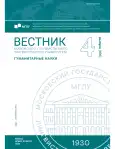Conceptual Metaphor in Chinese Idioms: Lexicographic Data
- Authors: Krasikova E.A.1
-
Affiliations:
- Moscow State Linguistic University
- Issue: No 4(898) (2025)
- Pages: 42-48
- Section: Linguistics
- URL: https://journal-vniispk.ru/2542-2197/article/view/291885
- ID: 291885
Cite item
Abstract
The article discusses the metaphorical concepts that underlie the formation of phraseological units of the Chinese language, and determines their activity proceeding from information provided by lexicographic sources. The point of departure is the consideration of the scope of phraseology in the Chinese language which comprises various groups of stable word combinations. So, one of the objectives of the study is to clarify the classification of the phraseological units in Chinese, as well as look at the principles of the selection of stable phrases in the Chinese linguistic tradition. The research proves that Chinese linguists strive to combine the structural and semantic criteria of phraseological classification. An attempt is made to analyze the models of metaphorization and the most frequent metaphorical concepts forming phraseological images in the Chinese language.
About the authors
Elizaveta Alexandrovna Krasikova
Moscow State Linguistic University
Author for correspondence.
Email: krasikova.liza@mail.ru
PhD (Philology), Associate Professor at the Department of Rare Languages Teaching Methodology
Russian FederationReferences
- Belyaevskaya, E. G. (2020). Metaphorization as a mechanism for constructing images in language and text. Language. Culture. Art (pp. 170–180). A collection of scientific works dedicated to the memorable anniversary of Veroniki Nikolaevny Teliya. Moscow: Gnozis. (In Russ.)
- Teliya, V. N. (1996). Russkaja frazeologija. Semanticheskij, pragmaticheskij i lingvokul'turologicheskij aspekty = Russian phraseology. Semantic, pragmatic and linguoculturological aspects: monograph. Moscow: Shkola “Language of Russian culture”. (In Russ.)
- Sun Weizhang (1989). Phraseology of the Chinese language [孙维张。汉语熟语学。吉林:教育出版社]. Phraseology of the Chinese language, Jilin: jiaoyu chubanshe. (In Chin.)
- Zykova, I. V. (2014). Rol' konceptosfery kul'tury v formirovanii frazeologizmov kak kul'turno-jazykovyh znakov = The role of the ‘conceptosphere of culture in the formation of phraseological units as cultural and linguistic signs: Senior Doctorate in Philology. Moscow. (In Russ.)
- Vinogradov, V. V. (1977). Izbrannye trudy. Leksikologija i leksikografija = Selected works. Lexicology and lexicography. Moscow. (In Russ.)
- Xing Fuyi Фуи. Chinese Grammar [邢福义。汉语语法学]. Beijing, shangshuguan. (In Chin.)
- Suiyue Wenhua (2022). 1800 proverbs, sayings and idioms [随阅文化。谚语俗语惯用语 1800 条 。北京:北京 工艺美术出版社]. Beijing: Beijing gongyi meishu chubanshe. (in Chin.)
- Cheng yu da cidian (2022). [成语大词典:彩色本/《成语大词典» 编委会编 一2版。北京:商务印书馆国际有 限公司,2013.1 (2022.10重印)]. Big Dictionary of Chinese Idioms. (In Chin.)
- Zhang Zonghua (1985). On the question of the principles of selection and inclusion in the dictionary of guanyunyu. [张宗华。关于惯用语词典的收词问题。辞书研究]. Cishu yanjiu, 70–71. (In Chin.)
- Ma Gofan (1961). Proverbs, omissions, familiar expressions. [马国凡。谚语•歇后语•惯用语。辽宁:人民出版社]. Liaoning: renmin chubanshe. (In Chin.)
- Zhou Jian (1997). About stable language combinations consisting of three and four hieroglyphic signs. [周荐。论三字语和四字语:语文研究]. Yuwen yanjiu, 26–31. (In Chin.)
- Zykova, I. V. (2015). Konceptosfera kul'tury i frazeologija: Teorija i metody lingvokul'turologicheskogo izuchenija = Conceptosphere of culture and phraseology: Theory and methods of linguoculturological study. Moscow. (In Russ.)
- Zhang Jinyu (2017). 101 Modern Chinese Phrases [张锦玉。惯用语101。北京:华语教学出版社]. Beijing: huayu jiaoxue chubanshe. (In Chin.)
Supplementary files










